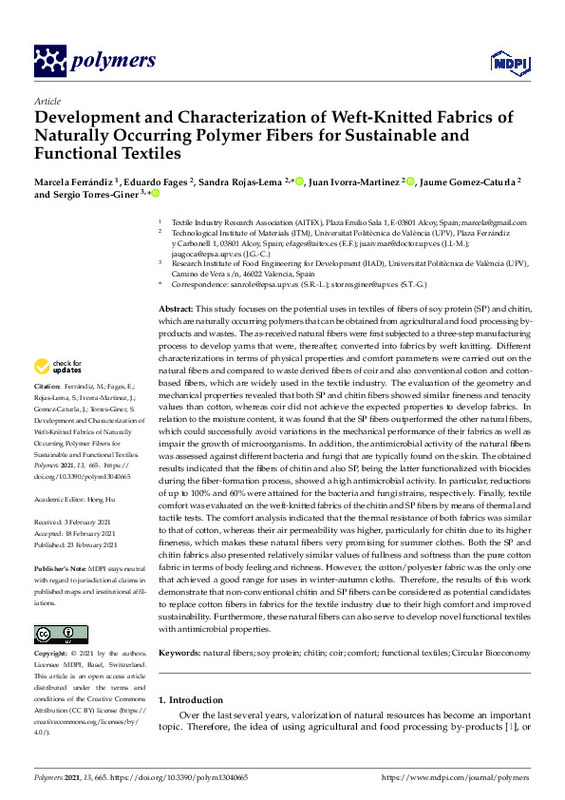JavaScript is disabled for your browser. Some features of this site may not work without it.
Buscar en RiuNet
Listar
Mi cuenta
Estadísticas
Ayuda RiuNet
Admin. UPV
Development and Characterization of Weft-Knitted Fabrics of Naturally Occurring Polymer Fibers for Sustainable and Functional Textiles
Mostrar el registro sencillo del ítem
Ficheros en el ítem
| dc.contributor.author | Ferrándiz, Marcela
|
es_ES |
| dc.contributor.author | Fages, Eduardo
|
es_ES |
| dc.contributor.author | Rojas-Lema, Sandra Paola
|
es_ES |
| dc.contributor.author | Ivorra-Martinez, Juan
|
es_ES |
| dc.contributor.author | Gomez-Caturla, Jaume
|
es_ES |
| dc.contributor.author | Torres-Giner, Sergio
|
es_ES |
| dc.date.accessioned | 2022-04-05T06:27:52Z | |
| dc.date.available | 2022-04-05T06:27:52Z | |
| dc.date.issued | 2021-02 | es_ES |
| dc.identifier.uri | http://hdl.handle.net/10251/181730 | |
| dc.description.abstract | [EN] This study focuses on the potential uses in textiles of fibers of soy protein (SP) and chitin, which are naturally occurring polymers that can be obtained from agricultural and food processing by-products and wastes. The as-received natural fibers were first subjected to a three-step manufacturing process to develop yarns that were, thereafter, converted into fabrics by weft knitting. Different characterizations in terms of physical properties and comfort parameters were carried out on the natural fibers and compared to waste derived fibers of coir and also conventional cotton and cotton-based fibers, which are widely used in the textile industry. The evaluation of the geometry and mechanical properties revealed that both SP and chitin fibers showed similar fineness and tenacity values than cotton, whereas coir did not achieve the expected properties to develop fabrics. In relation to the moisture content, it was found that the SP fibers outperformed the other natural fibers, which could successfully avoid variations in the mechanical performance of their fabrics as well as impair the growth of microorganisms. In addition, the antimicrobial activity of the natural fibers was assessed against different bacteria and fungi that are typically found on the skin. The obtained results indicated that the fibers of chitin and also SP, being the latter functionalized with biocides during the fiber-formation process, showed a high antimicrobial activity. In particular, reductions of up to 100% and 60% were attained for the bacteria and fungi strains, respectively. Finally, textile comfort was evaluated on the weft-knitted fabrics of the chitin and SP fibers by means of thermal and tactile tests. The comfort analysis indicated that the thermal resistance of both fabrics was similar to that of cotton, whereas their air permeability was higher, particularly for chitin due to its higher fineness, which makes these natural fibers very promising for summer clothes. Both the SP and chitin fabrics also presented relatively similar values of fullness and softness than the pure cotton fabric in terms of body feeling and richness. However, the cotton/polyester fabric was the only one that achieved a good range for uses in winter-autumn cloths. Therefore, the results of this work demonstrate that non-conventional chitin and SP fibers can be considered as potential candidates to replace cotton fibers in fabrics for the textile industry due to their high comfort and improved sustainability. Furthermore, these natural fibers can also serve to develop novel functional textiles with antimicrobial properties. | es_ES |
| dc.description.sponsorship | This research work was funded by the Spanish Ministry of Science and Innovation (MICI) project number MAT2017-84909-C2-2-R. | es_ES |
| dc.language | Inglés | es_ES |
| dc.publisher | MDPI AG | es_ES |
| dc.relation.ispartof | Polymers | es_ES |
| dc.rights | Reconocimiento (by) | es_ES |
| dc.subject | Natural fibers | es_ES |
| dc.subject | Soy protein | es_ES |
| dc.subject | Chitin | es_ES |
| dc.subject | Coir | es_ES |
| dc.subject | Comfort | es_ES |
| dc.subject | Functional textiles | es_ES |
| dc.subject | Circular Bioeconomy | es_ES |
| dc.subject.classification | CIENCIA DE LOS MATERIALES E INGENIERIA METALURGICA | es_ES |
| dc.subject.classification | INGENIERIA DE LOS PROCESOS DE FABRICACION | es_ES |
| dc.title | Development and Characterization of Weft-Knitted Fabrics of Naturally Occurring Polymer Fibers for Sustainable and Functional Textiles | es_ES |
| dc.type | Artículo | es_ES |
| dc.identifier.doi | 10.3390/polym13040665 | es_ES |
| dc.relation.projectID | info:eu-repo/grantAgreement/AEI/Plan Estatal de Investigación Científica y Técnica y de Innovación 2013-2016/MAT2017-84909-C2-2-R/ES/PROCESADO Y OPTIMIZACION DE MATERIALES AVANZADOS DERIVADOS DE ESTRUCTURAS PROTEICAS Y COMPONENTES LIGNOCELULOSICOS/ | es_ES |
| dc.rights.accessRights | Abierto | es_ES |
| dc.contributor.affiliation | Universitat Politècnica de València. Instituto Universitario de Ingeniería de Alimentos para el Desarrollo - Institut Universitari d'Enginyeria d'Aliments per al Desenvolupament | es_ES |
| dc.contributor.affiliation | Universitat Politècnica de València. Instituto de Tecnología de Materiales - Institut de Tecnologia de Materials | es_ES |
| dc.description.bibliographicCitation | Ferrándiz, M.; Fages, E.; Rojas-Lema, SP.; Ivorra-Martinez, J.; Gomez-Caturla, J.; Torres-Giner, S. (2021). Development and Characterization of Weft-Knitted Fabrics of Naturally Occurring Polymer Fibers for Sustainable and Functional Textiles. Polymers. 13(4):1-17. https://doi.org/10.3390/polym13040665 | es_ES |
| dc.description.accrualMethod | S | es_ES |
| dc.relation.publisherversion | https://doi.org/10.3390/polym13040665 | es_ES |
| dc.description.upvformatpinicio | 1 | es_ES |
| dc.description.upvformatpfin | 17 | es_ES |
| dc.type.version | info:eu-repo/semantics/publishedVersion | es_ES |
| dc.description.volume | 13 | es_ES |
| dc.description.issue | 4 | es_ES |
| dc.identifier.eissn | 2073-4360 | es_ES |
| dc.identifier.pmid | 33672322 | es_ES |
| dc.identifier.pmcid | PMC7926964 | es_ES |
| dc.relation.pasarela | S\429084 | es_ES |
| dc.contributor.funder | Agencia Estatal de Investigación | es_ES |
| dc.subject.ods | 12.- Garantizar las pautas de consumo y de producción sostenibles | es_ES |








